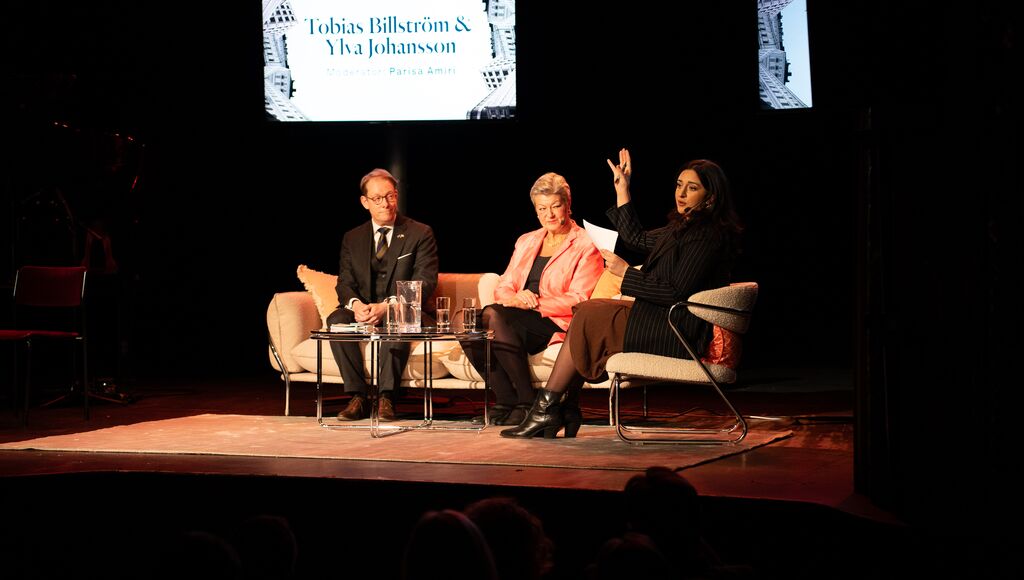
Panel discussion: navigating the new normal in global politics
Insights|March 7, 2025
In a world undergoing rapid change, political leaders must adapt to new challenges, shifting alliances, and ongoing crises. Governments and institutions play a crucial role in navigating this evolving landscape, balancing diplomacy, crisis management, and international cooperation.
These themes were central to a panel discussion moderated by journalist Parisa Amiri, featuring former Swedish Minister for Foreign Affairs Tobias Billström and former European Commissioner for Home Affairs Ylva Johansson. The conversation explored how political leaders respond to global challenges, with a particular focus on the European Union’s role in shaping international relations.
Staying informed in a constant news cycle
The conversation began with reflections on the speakers’ public careers and how they manage the overwhelming flow of information. Tobias noted that he deliberately limits his news intake, arguing that being constantly immersed in the media can be counterproductive. This led to a discussion on “news hygiene” – the balance between staying informed and avoiding information overload. Ylva, in contrast, shared that in her previous roles, she relied on her team to filter critical news, allowing her to focus on decision-making rather than daily media consumption.
Crisis management: a proactive European Union
Crises have always existed, but Ylva pointed out that the European Union is now more proactive than ever in responding to them. She cited the Ukraine invasion, explaining that within days, the EU had to prepare for a massive influx of refugees. One of the key measures implemented was the Temporary Protection Directive, a law enabling displaced individuals to receive immediate protection and rights within the EU. This directive had existed for over 20 years but was activated for the first time. Ylva emphasized the importance of building trust among EU member states, highlighting her direct engagement with leaders in Poland, Romania, Hungary, and the Czech Republic – countries most impacted by the refugee crisis.
Diplomatic challenges and NATO membership
Tobias discussed Sweden’s diplomatic challenges, particularly in the context of Quran-burning incidents, which led to a potential trade embargo from the Organization of Islamic Cooperation (OIC) member states. He described this as an acute diplomatic crisis that required careful navigation. He also underlined Sweden’s need for strong international alliances, with NATO membership serving as a key example of securing the country’s position on the global stage.
Global power shifts and the role of the EU
The discussion turned to U.S. foreign policy, particularly the influence of former President Donald Trump and America’s stance on Russia. Ylva argued that the EU must act as a counterbalance to major geopolitical players such as Russia, China, and Iran. She emphasized that the EU must speak a “power language,” demonstrating unity and strength in international affairs.
Tobias agreed that the EU plays a crucial role in maintaining global balance but stressed the need for increased efficiency and faster decision-making. He also predicted that Sweden’s debate on adopting the Euro would resurface soon.
The changing world order
Ylva warned that the global order is not just “cracking” but actively falling apart. She criticized the idea of countries prioritizing only their own interests, citing the notion that in Ukraine, Putin would take land while the U.S. is proposing to secure minerals as an example of this flawed approach, though it is not yet certain. She also raised concerns about the growing influence of disinformation and election interference, highlighting that the U.S. has now become a player in European elections – a shift that she described as both unprecedented and alarming.
Europe’s defense and future leadership
Both speakers agreed that European defense investments must increase, particularly in supporting Ukraine. Ylva warned that if a ceasefire were reached today, Russia could rebuild its military strength within a few years. To prevent future threats, Europe must take greater responsibility for its own security.
Looking at leadership, Ylva noted that past EU leaders made bold decisions, such as the creation of the single market and the Euro, while today’s leaders are more cautious. However, she observed that current leaders have been able to unite people in ways not seen before. Tobias concluded by emphasizing that with NATO expanding to include all Baltic nations bordering Russia, Europe has gained strategic security and the ability to share intelligence more effectively.
Conclusion
The panel discussion made one thing clear: the world is undergoing profound shifts, and governments must adapt quickly. Whether through crisis management, diplomatic strategy, or technological regulation, the EU must take a more active role in shaping the future. Both Tobias and Ylva underscored the importance of unity, decisive action, and strong alliances in navigating the “new normal” of global politics.